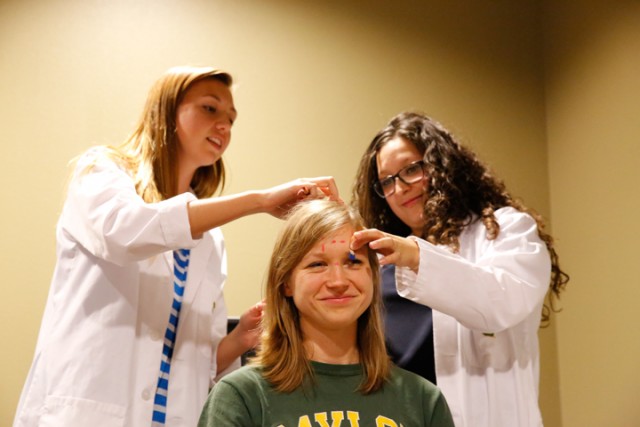By Ashley Webb
Baylor University has been working hard for the past month conducting sleep research in its newly opened Sleep Neuroscience and Cognition Laboratory.
Dr. Michael K. Scullin, director of the sleep lab, has been conducting research on the effects of sleep on cognition, memory and learning in young adults.
Scullin’s lab is a 1,650-square-foot lab consisting of three bedrooms equipped with sleep recording technology. There are monitoring screens and equipment to measure the brain’s electrical activities.
“We are getting individuals of all different ages, from college students to people from the community in their 40s, 50s, 60s, and we’re trying to identify changes in physiology, sleep fragmentation, slow waves, and see which of these changes is most important in memory and cognition,” Scullin said.
Participants in Scullin’s research spend three nights in the observation laboratory. To increase participation, Scullin makes the experience as pleasant as possible.
“One of our goals is to get people as relaxed as possible when they come here. So we have things like spa music and we dim the lights. We tell them what we’re going to do and they can tell us if anything is uncomfortable,” Scullin said.
Baylor undergraduate research technicians Madison Krueger and Claudina Tami demonstrated what participants would go through on dissertation-level graduate student Michelle Dasse.
Krueger and Tami attach electrodes to Dasse’s head to read brain activity. Scullin uses this information to detect different activity levels in the brain while participants are sleeping.
Scullin researches why certain areas of the brain are more active at night than others. Scullin is also interested in eye movement. In order to do this, he observes how much fragmented sleep and Rapid Eye Movement participants experience.
While participants are sleeping or getting ready to sleep, Scullin is able to observe them in the technician station. He is able to see on a monitor which part of the brain is sleeping the hardest and which part of the brain is activated.
“We give them a minute to relax, and then the signal will start to clear up [from black] and we start running them through biocalibrations,” Scullin said.
These biocalibrations ensure that the electrical activity signal corresponds with what is being asked. If the signal is faulty, then false information will be collected while participants are asleep. To test the signal, Tami had Dasse perform some simple commands.
Tami said Dasse should hold her head still and open her eyes. Dasse blinked multiple times, turned her head and ground her teeth.
When Dasse did the commands, the monitor showed that the electronic activities were performing properly. While doing these commands, Tami watched the different changes in electronic activities. When an action was being performed, the electronic activities on the screen would increase.
“We are looking for a dominant rhythm. When we see this rhythm, it ensures us that when it goes away, we know that the person is asleep,” Scullin said.
So far, Scullin has had 30 people in his experiments. In the first experiment, he looked at healthy, young adults to see how their sleep relates to the cognitive test that is given. The next step in his study is to look at older people.
“We want to broaden out to people in their middle ages and later decades of life,” Scullin said.
Scullinsaid he hopes to collaborate even more with the Waco community and help them with their sleep. He wants to follow people and, down the road, see if the quality of their sleep predicts how well their memory is preserved.



